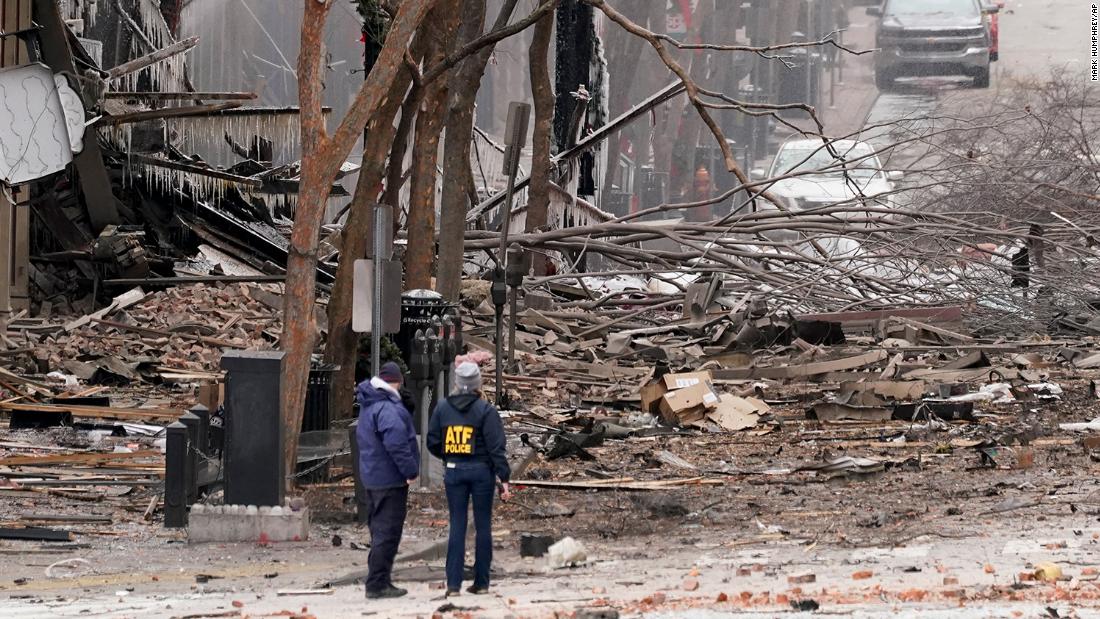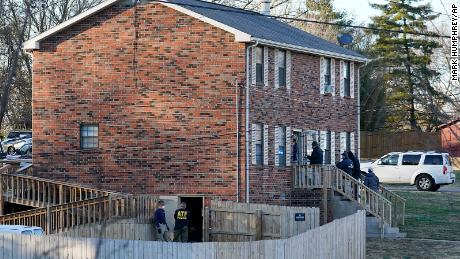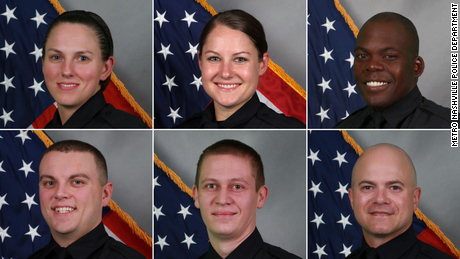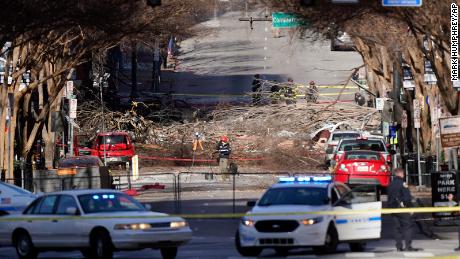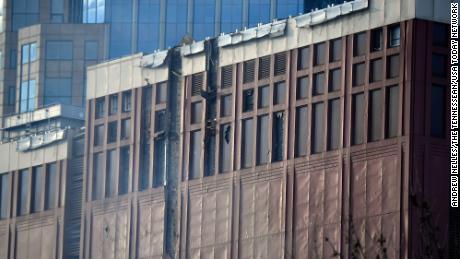Anthony Quinn Warner identified as Nashville bomber
“We’ve come to the conclusion that an individual named Anthony Warner is the bomber. He was present when the bomb went off and then he perished,” said Don Cochran, US attorney for the Middle District of Tennessee, during a Sunday evening news conference.
DNA taken from the scene was matched to Warner by forensic analysts, Tennessee Bureau of Investigation Director David Rausch said at the news conference.
Warner, 63, of nearby Antioch, Tennessee, had already been identified as a person of interest in the explosion of a recreational vehicle in downtown Nashville on Christmas morning.
There is no indication that anybody else was involved and no motive has been determined, said Douglas Korneski, FBI special agent in charge of the Memphis field office.
During a press conference, Korneski declined to comment when asked if the blast could be considered domestic terrorism.
Forensic analysts at the FBI lab in Quantico, Virginia, and the Tennessee Bureau of Investigations matched DNA taken from the explosion scene to Warner, Korneski said.
A vehicle ID number from the RV was also a match for Warner, he said.
Korneski said anyone who may have known Warner or encountered him should contact the FBI so investigators can establish a motive.
“These answers won’t come quickly,” he said. “Though we may be able to answer some of those questions … none of those answers will ever be enough for those affected by this event.”
When asked by a reporter if Warner had previously been on law enforcement’s radar, Rausch said, “No, he has not.”
Investigators were able to match DNA samples to Warner quickly because they were able to collect DNA from family members, Korneski said.
Authorities earlier said they believed Warner’s remains were found at the blast site, according to several law enforcement officials with direct knowledge of the investigation, who spoke to CNN on the condition of anonymity.
The FBI also gathered DNA from Warner’s home, which they began searching Saturday, those sources said.
CNN has attempted to contact Warner’s family members but has not heard back.
That’s exactly what happened next. The explosion tore through buildings, shattered windows and left the street littered with branches, glass and flaming debris.
Here’s what we know so far.
What happened
Several hours later, a resident in the area said she woke up to what sounded like “an automatic weapon.”
When she heard the sound again, she called 911. Police said they were called to the location after a report of shots fired around 5:30 a.m.
When officers responded to the scene, they found a white RV parked in front of an AT&T transmission building that was repeatedly broadcasting a warning that an explosion would occur in 15 minutes, police said.
A computerized voice warned residents to “evacuate now,” the resident recalled.
Nashville police officers involved in the response told reporters Sunday morning that the recording changed as they were working to evacuate residents from nearby buildings, eventually giving a three-minute warning, as well as playing the 1964 song “Downtown” by Petula Clark.
The blast occurred at 6:30 a.m.
Authorities went to a home after the explosion
Public records show that Warner owned a home on Bakertown Road in Antioch until November 25, 2020, when he signed a quit claim deed giving ownership of the home to a woman.
Federal investigators were at the home Saturday conducting “court-authorized activity,” FBI spokesman Jason Pack told CNN.
Bomb technicians cleared the house to make sure it was safe for the evidence team to enter, Pack said, but would not confirm who lives at that address.
A tip about the RV involved in the explosion led law enforcement officials to the Bakertown Road home, a law enforcement official told CNN.
An RV seen on Google Street View at the home appears to match the image of the one authorities posted when they asked the public for information about the vehicle. Investigators believe the RV seen in the photos is the same one at the center of the explosion, the law enforcement source said, but they can’t be certain because it was destroyed in the blast.
CNN’s analysis of Google Street View images indicates that the RV has been around the property since at least April 2013.
Two neighbors told CNN they had definitely seen the RV that is pictured in the Google satellite photos. They said that while they haven’t been out much in the colder weather, they remember seeing it parked there during the summer.
Warner had previously deeded his other property on Bakertown Road to the same woman in 2019, according to public records.
Warner previously had explosive user permits handler license
Warner was issued an explosive user permits handler license in November 2013 that expired in November 2016, public records show.
He was also issued an alarm contractor license in November 1993, which expired in 1998, according to Tennessee licensing records.
A man who hired Warner as computer consultant told CNN that the “Tony Warner we knew is a nice person who never exhibited any behavior which was less than professional.”
Steve Fridrich of Fridrich & Clark LLC said in a statement that Warner worked for his real estate agency as an independent contractor for several years, servicing the firm’s computers. Warner said earlier this month he was retiring and the company had no contact with Warner since then, Fridrich said.
When he learned Warner was a suspect in the bombing, Fridrich said he notified authorities about the work he had performed for his company.
Officials have not connected blast to terrorism
Investigators are looking at “any and all possible motives” in the bombing, Korneski said during the Sunday evening press conference.
Korneski was asked about associates of Warner being questioned about Warner’s possible beliefs about telecommunications.
“We’re not at a position to speculate on that now,” Korneski said, adding they are interviewing people who knew Warner or were familiar with his ideology.
The bombing has not been deemed an act of domestic terrorism because it would have to be tied to an ideology or committed in furtherance of a political or social ideology, Korneski said.
Officials haven’t connected the explosion in any way to terrorism, and according to one federal law enforcement source, there were no known credible threats in the Nashville area that would have signaled an impending attack on or before Christmas.
A second law enforcement source said federal authorities are not aware of any increased chatter nationally by known extremist groups that would indicate any credible plans for conducting attacks around the holidays.
While investigators continue gathering information on who may have been responsible for the explosion and why they did it, one expert says the blast likely wasn’t supposed to cause a mass killing.
“What makes this so perplexing is the fact that it doesn’t appear that the person or people who conspired to do this had any interest in causing any type of mass casualties,” said James Gagliano, a retired FBI supervisory special agent and CNN law enforcement analyst.
Mayor John Cooper said the explosion was “clearly done when no one was going to be around.”
“It would be a different message if it was 5 p.m. on a Friday,” the mayor said. “It seems intentional, but it seems like a one-off.”
AT&T says wireless service largely restored
The network hub in downtown Nashville “suffered significant damage in the blast,” AT&T Communications CEO Jeff McElfresh said in a letter to customers on Sunday evening. AT&T was able to reroute some network traffic, but not all.
“Given its importance to customers and first responders, we prioritized restoration of wireless service,” McElfresh said. “As of now, 96% of our wireless network is restored, 60% of our business services are restored, and 86% of our consumer broadband and entertainment services are restored. It is our goal to restore all service late today.”
In the immediate aftermath of the blast, AT&T service in Nashville remained online, thanks to backup power supplies.
“Unfortunately, a combination of the explosion and resulting water and fire damage took out a number of backup power generators intended to provide power to the batteries,” McElfresh said. “That led to service disruptions across parts of Tennessee, Kentucky and Alabama.”
When one network hub is disrupted, typically by a hurricane or other natural disaster, some internet traffic can be rerouted, but not all — that’s why customers across Nashville and other parts of the state reported losing wireless phone service and other connectivity.
An AT&T spokesman declined to comment on speculation that its facility may have been the target of the suspected suicide bomber.
CNN’s parent company, WarnerMedia, is owned by AT&T.
Correction: An earlier version of this story wrongly identified the source who told CNN that a tip about the RV led officials to the home of a person of interest. That information is from a law enforcement official.
CNN’s Natasha Chen, Margaret Given, Kay Jones, Eric Levenson, Paul P. Murphy, Evan Perez, Shimon Prokupecz, Hollie Silverman, and Brian Stelter contributed to this report.
![]()


